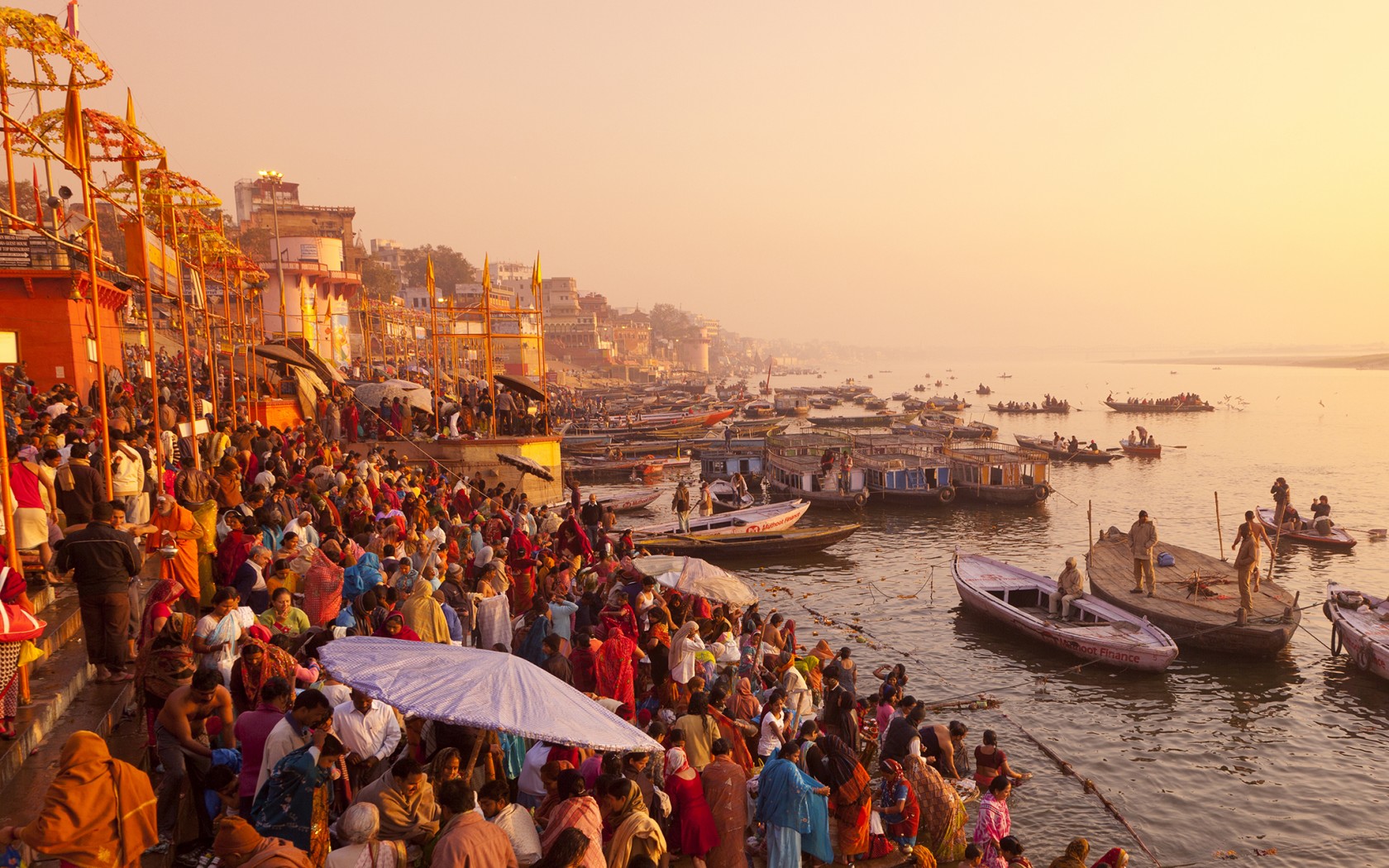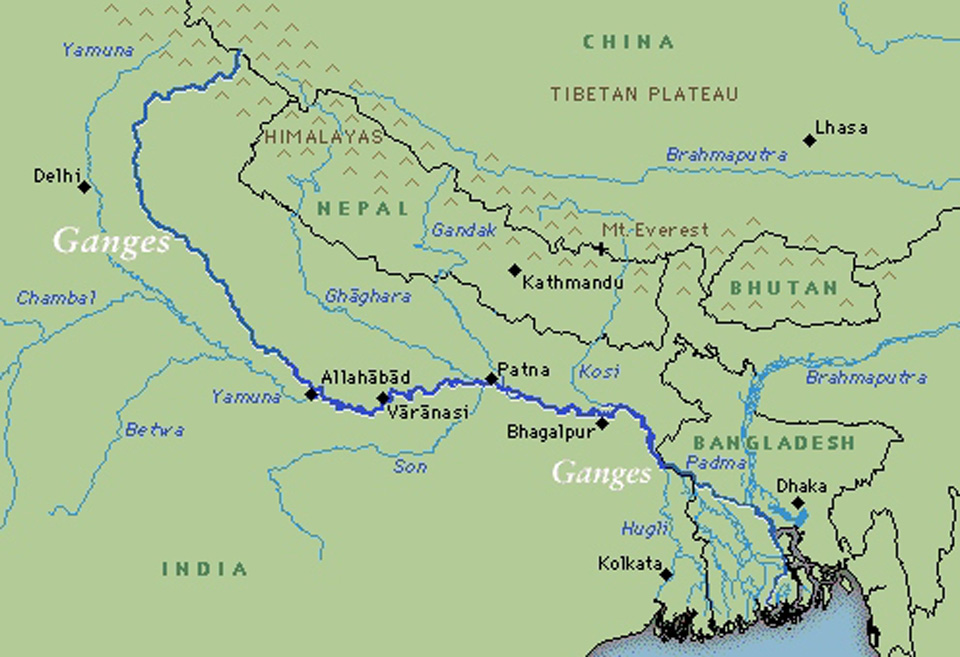Der Ganges (Sanskrit, f., गंगा oder गङ्गा, Gaṅgā) ist der über 2.600 km lange und damit zweitgrößte Fluss Indiens und Bangladeschs (Südasien). Er durchfließt die große Ebene südlich des Himalaya, eines der am dichtesten bevölkerten Gebiete der Erde. Der Ganges ist der heiligste Fluss der Hindus; er ist sehr stark durch Abwässer und Schadstoffe belastet.

恒河(梵语:गङ्गा,印地语:गंगा,乌尔都语:گنگا(Ganga)国际音标发音:[ˈɡəŋɡaː]  聆听;泰米尔语:கங்கை,孟加拉语:গঙ্গা Gônga,玄奘译为殑伽河)是南亚的一条主要河流,流经印度北部及孟加拉。恒河源头帕吉勒提河和阿勒格嫩达河发源自印度北阿坎德邦的根戈德里等冰川,它横越北印度平原(即恒河平原),流经北方邦,会合其最大支流亚穆纳河,再流经比哈尔邦、西孟加拉邦,最后它分为多条分流注入孟加拉湾,其中一条是加尔各答附近的胡格利河,另外一条是进入孟加拉国的博多河,博多河进入孟加拉国后,会合布拉马普特拉河(中国境内为雅鲁藏布江)在孟加拉国境内的下游贾木纳河,注入孟加拉湾,其入海河段称为梅格纳河。支流布拉马普特拉河及其以上部分不算在内,恒河长为2,510公里,流域面积91万平方公里,达印度国土面积的三分之一,恒河也为世界河水流量前20大的河流之一[4]。恒河流域为世界上最多人口居住的河流流域,共有4亿以上人口居住于恒河流域,人口密度达每平方英里1000人以上[5]。
聆听;泰米尔语:கங்கை,孟加拉语:গঙ্গা Gônga,玄奘译为殑伽河)是南亚的一条主要河流,流经印度北部及孟加拉。恒河源头帕吉勒提河和阿勒格嫩达河发源自印度北阿坎德邦的根戈德里等冰川,它横越北印度平原(即恒河平原),流经北方邦,会合其最大支流亚穆纳河,再流经比哈尔邦、西孟加拉邦,最后它分为多条分流注入孟加拉湾,其中一条是加尔各答附近的胡格利河,另外一条是进入孟加拉国的博多河,博多河进入孟加拉国后,会合布拉马普特拉河(中国境内为雅鲁藏布江)在孟加拉国境内的下游贾木纳河,注入孟加拉湾,其入海河段称为梅格纳河。支流布拉马普特拉河及其以上部分不算在内,恒河长为2,510公里,流域面积91万平方公里,达印度国土面积的三分之一,恒河也为世界河水流量前20大的河流之一[4]。恒河流域为世界上最多人口居住的河流流域,共有4亿以上人口居住于恒河流域,人口密度达每平方英里1000人以上[5]。
恒河被印度教徒视为圣河,也是河流周边居民维持日常生活所需的命脉[6]。印度教中也有称为“恒河女神”的神祇[7]。许多过去的省会及帝国首都曾设于恒河沿岸,如巴连弗邑[8]、曲女城[8]、瓦拉纳西、安拉阿巴德、穆尔斯希达巴德、蒙格埃尔、巴哈拉姆普尔、加尔各答等。
ガンジス川(ガンジスがわ、英語: Ganges)は、ヒマラヤ山脈の南側、インド亜大陸の北東部を流れる大河である。全長は約2525km[1]、流域面積は約173万km2(ただしブラフマプトラ川水系を除くと約84万km2)。
The Ganges ( GAN-jeez), or Ganga (Hindustani: [ˈɡəŋɡaː], is a trans-boundary river of the Indian subcontinent which flows through the nations of India and Bangladesh. The 2,525 km (1,569 mi) river rises in the western Himalayas in the Indian state of Uttarakhand, and flows south and east through the Gangetic Plain of North India. After entering West Bengal, it divides into two rivers: the Hooghly and the Padma River. The Hooghly, or Adi Ganga, flows through several districts of West Bengal and into the Bay of Bengal near Sagar Island. The other, the Padma, also flows into and through Bangladesh, and joins the Meghna river which ultimately empties into the Bay of Bengal.
The Ganges is one of the most sacred rivers to Hindus.[4] It is also a lifeline to millions of Indians who live along its course and depend on it for their daily needs. It is worshipped in Hinduism and personified as the goddess Gaṅgā.[5] It has also been important historically, with many former provincial or imperial capitals (such as [6] Kannauj, Kampilya, [6] Kara, Prayag or Allahabad, Kashi, Pataliputra or Patna, Hajipur, Munger, Bhagalpur, Baranagar, Murshidabad, Baharampur, Nabadwip, Saptagram and Kolkata) located on its banks.
El
río Ganges es un río transfronterizo de Asia que fluye a través de las naciones de
India y
Bangladesh.
This image, video or audio may be copyrighted. It is used for educational purposes only. If you find it, please notify us by
and we will remove it immediately.
This image, video or audio may be copyrighted. It is used for educational purposes only. If you find it, please notify us by
and we will remove it immediately.
恒河
(Ganges River)印地语作Ganga。是
印度北部的大河,自远古以来一直是印度教徒的圣河。其大部流程为宽阔、缓慢的水流,流经世界上土壤最肥沃和人口最稠密地区之一。尽管地位重要,但其2,510
公里(1,560哩)的长度使其无论以世界标准还是亚洲标准衡量都显得短了一些。恒河源出喜马拉雅山南麓加姆尔的甘戈特力(实为塔婆万草原,说法不同的原因是印度对恒河源头说主要出于宗教考虑,而不是根据地理)
冰川,全长2700千米,流域面积106万平方千米(不包括支流
贾木纳河及其以上部分);河口处的年平均流量为2.51万立方米/秒;其中在印度境内长2071千米,流域面积95万平方千米,年平均
流量为1.25万立方米/秒。恒河发源于
喜马拉雅山脉,注入孟加拉湾,
流域面积占印度领土1/4,
养育著高度密集的人口。恒河流经恒河平原,这是印度斯坦地区的中心,亦是从西元前3世纪
阿育王的王国至16世纪建立的蒙兀儿帝国为止一系列文明的摇篮。 恒河大部流程流经印度领土,不过其在孟加拉地区的巨大的三角洲主要位于孟加拉境内。恒河总流向是从北-西北至东南。在三角洲,水流一般南向 。
印度是
四大文明古国之一,曾经创造了人类历史上著名的“恒河文明”。恒河这条世界名川,被
印度人民 尊称为“圣河”和“印度的母亲”。众多的神话故事和宗教传说构成了恒河两岸独特的风土人情。恒河是印度的圣河,历史悠久,有着浓厚的民俗和文化色彩,即使 经过千年的文明洗礼,恒河两岸的人们仍然保持着古老的习俗。许多自古流传的神话,使印度人民对恒河母亲生起无限的怀想,烙下一个不可磨灭的情结。这一生中 至少要在恒河中沐浴一次,让圣河洗净生生世世所有的罪业。
在印度,大多数印度教信徒终生怀有4大乐趣:敬仰
湿婆神、到恒河洗圣水澡并饮用恒河圣水、结交圣人朋友和居住在
瓦拉纳西(Varanasi)圣城。恒河用甘甜的乳汁哺育着两岸人民,加上他们虔诚的宗教信仰,被视为“圣河”。印度人视恒河为圣河,将恒河看做是女神的化身,虔诚地敬仰恒河,据说是起源于一个传说故事。古时候,恒河水流湍急、汹涌澎湃,经 常泛滥成灾,毁灭良田,残害生灵,有个国王为了洗刷先辈的罪孽,请求天上的女神帮助驯服恒河,为人类造福。湿婆神来到喜马拉雅山下,散开头发,让汹涌的河 水从自己头上缓缓流过,灌溉两岸的田野,两岸的居民得以安居乐业。从此,印度教便将恒河奉若神明,敬奉湿婆神和洗圣水澡成为印度教徒的两大宗教活动。
This image, video or audio may be copyrighted. It is used for educational purposes only. If you find it, please notify us by
and we will remove it immediately.


![]() 聆听;泰米尔语:கங்கை,孟加拉语:গঙ্গা Gônga,玄奘译为殑伽河)是南亚的一条主要河流,流经印度北部及孟加拉。恒河源头帕吉勒提河和阿勒格嫩达河发源自印度北阿坎德邦的根戈德里等冰川,它横越北印度平原(即恒河平原),流经北方邦,会合其最大支流亚穆纳河,再流经比哈尔邦、西孟加拉邦,最后它分为多条分流注入孟加拉湾,其中一条是加尔各答附近的胡格利河,另外一条是进入孟加拉国的博多河,博多河进入孟加拉国后,会合布拉马普特拉河(中国境内为雅鲁藏布江)在孟加拉国境内的下游贾木纳河,注入孟加拉湾,其入海河段称为梅格纳河。支流布拉马普特拉河及其以上部分不算在内,恒河长为2,510公里,流域面积91万平方公里,达印度国土面积的三分之一,恒河也为世界河水流量前20大的河流之一[4]。恒河流域为世界上最多人口居住的河流流域,共有4亿以上人口居住于恒河流域,人口密度达每平方英里1000人以上[5]。
聆听;泰米尔语:கங்கை,孟加拉语:গঙ্গা Gônga,玄奘译为殑伽河)是南亚的一条主要河流,流经印度北部及孟加拉。恒河源头帕吉勒提河和阿勒格嫩达河发源自印度北阿坎德邦的根戈德里等冰川,它横越北印度平原(即恒河平原),流经北方邦,会合其最大支流亚穆纳河,再流经比哈尔邦、西孟加拉邦,最后它分为多条分流注入孟加拉湾,其中一条是加尔各答附近的胡格利河,另外一条是进入孟加拉国的博多河,博多河进入孟加拉国后,会合布拉马普特拉河(中国境内为雅鲁藏布江)在孟加拉国境内的下游贾木纳河,注入孟加拉湾,其入海河段称为梅格纳河。支流布拉马普特拉河及其以上部分不算在内,恒河长为2,510公里,流域面积91万平方公里,达印度国土面积的三分之一,恒河也为世界河水流量前20大的河流之一[4]。恒河流域为世界上最多人口居住的河流流域,共有4亿以上人口居住于恒河流域,人口密度达每平方英里1000人以上[5]。







